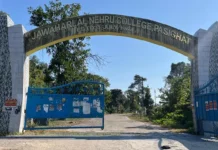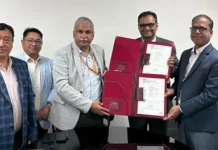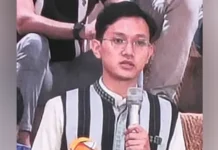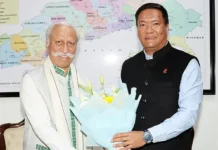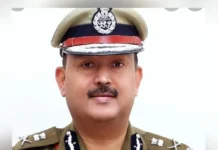NEW DELHI, 12 Jul: India sees its future with the United States and the United States sees its future with India, emphasised US Ambassador to India, Eric Garcetti, at the two-day ‘US-India defence news conclave: Stories of US-India defence and security partnership’ here, adding that commerce, technology, people and security are central to this vital partnership.
“We know that heads think the same and hearts feel the same but need to know if our feet are aligned too,” Garcetti said, delivering the keynote address at the final conclave of the series of the US-India defence news project, titled ‘Dialogues on deliverables to deliveries’, that concluded with insightful discussions and a forward-looking agenda for the US-India defence partnership.
The US Mission to India, in partnership with CUTS International, and in collaboration with the United Service Institution of India and the US-India Strategic Partnership Forum, organised this conclave in Delhi.
Noting that India-US ties are deep and broad, the US envoy affirmed that Americans’ enthusiasm for India has not died down a bit. “Our relationship is not a bet, it is a commitment and friendship that is true, tried, and is tested. It is not a win or lose or a zero-sum game, it’s all about trusting each other without the hope for return,” he said.
“When we stand together with our friends, we can ensure that right can make the might. When the two largest democracies come together, it reflects how much we value principles as the guiding light for peace in the world,” Garcetti underscored.
“We (United States) are with you (India) for the long haul and our leaders have pledged to go further in terms of technology, defence, startups, tech and space. We want India to be a place we come to, to fix our ships, to find great jobs, and to know each other’s systems and training,” he noted.
“Don’t take this relationship for granted; take this as marriage that requires effort,” the ambassador cautioned.
The event was a culmination of a series of sessions that were designed to foster meaningful discussions on the US-India defence partnership that aimed to bring industry experts from both countries and generate awareness about the growing partnership in the Indo-Pacific and beyond, among the traditional and online media professionals across India.
The event kicked off with a welcome session and an inaugural session, followed by the first session, ‘Celebrating India-US defence ties: The most consequential 21st century partnership’, that explored the historical evolution of the strategic relationship, current initiatives, and future growth areas.
Subsequent sessions included ‘Above & beyond: Bilateral partnership in space and the Indo-Pacific’,focusing on maritime security, space cooperation, and ocean diplomacy, and ‘CEOs of bilateral partnership: Co-design, co-develop & co-produce’, which addressed building a modern defence industrial ecosystem and enhancing joint R&D and manufacturing capabilities.
The second day of the conclave began with remarks by the Defense Attache of the US Embassy, Rear Admiral Michael Baker, who said, “The best method to deter war is having the capability and capacity, interoperability, will, and political resolve to win – which India and the United States have.”
India’s Defence Ministry’s International Cooperation Joint Secretary Vishesh Negi said, “India and the US are natural partners in the 21st century and beyond. This partnership has a robust defence and security focus, along with promoting regional stability and ensuring common prosperity for India and the United States. What we have now is a very robust military-to-military cooperation exercising together, and the major reasons are the use of similar technology and the interest in the Indo-Pacific region.”
The ‘Fourth pillar of democracy: Informed view of US-India defense relations,” panel with renowned journalists covering the defence sector from key national media outlets emphasised the role of media in shaping public perceptions, countering misinformation, and sharing success stories of bilateral defence collaborations.
The final session, ‘The road ahead: Indo-US for the global good’, outlined the next steps for the partnership, including overcoming challenges, promoting joint production and technology collaboration, and working within multilateral frameworks like the Quad.
In her closing remarks, Gloria Berbena, minister counsellor for public diplomacy at the US embassy here highlighted the need for more such conclaves,saying that “we launched this series of conclaves to try to help demystify aspect of our military and security relationship… recognising that unless what we are doing and trying to achieve in this area is clear and understandable for the average Indian and American citizens, in addition to those who think and work in this sector every day, we are not doing our jobs well. And ultimately, we are not serving our publics and our democracies well. Our security partnership must be as transparent as possible, and be open to scrutiny and discussion.”
She added, “A big part of that is fostering a strong and professional journalistic understanding, and to facilitate ready access to reliable and objectively verifiable information. These are pillars of every democratic nation, and they undergird public trust and accountability. As our nations navigate rapidly shifting and the oftentimes challenging geopolitical realties of this century, the need for an informed citizenry has never been more critical, and an informed citizenry depends on you all.”
Each session was moderated by defence experts and featured distinguished panelists, ensuring comprehensive and insightful discussions on strengthening the US-India defence and security partnership.
The event on day one started with a welcome address by retired major general BK Sharma, who is the director general of the United Service Institution of India, followed by an address from Pradeep S Mehta, secretary-general of CUTS International. Both speakers emphasised the crucial nature of the US-India partnership in the current geopolitical context.
Mehta said, “In the mid-to-long term, sustaining a strong, innovative, and resilient defence industrial base will be paramount to the security and prosperity of the current world order.”
“As we navigate these complex and dynamic times, it is imperative for India to develop its defence and civil industrial base. In this effort, the US should recognise India as a strategic partner by extending all such privileges as it does to its treaty allies,” Mehta added.
“This bilateral relationship has to be a win-win partnership as these are two democracies trying to drive their economies. To have a win-win partnership, we need to move faster as the delayed process is not the right process. Integrate the private players of both countries now,” urged Dr Mukesh Aghi, president and chief executive officer of the US-India Strategic Partnership Forum.

